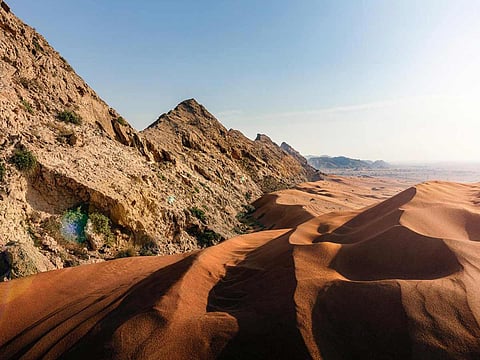Faya Palaeolandscape in Sharjah added to UNESCO World Heritage List
Site recognised for offering one of the oldest records of human presence in arid regions

Sharjah: The United Arab Emirates has achieved a major milestone in global heritage preservation, as the UNESCO World Heritage Committee formally inscribed Sharjah’s Faya Palaeolandscape onto its prestigious World Heritage List. The decision was announced during the 47th annual session held in Paris, marking a historic moment for both the UAE and the wider Arab region.
Located in the emirate’s central region, Faya Palaeolandscape has been recognised for its Outstanding Universal Value (OUV) as one of the oldest and most continuous records of early human presence in arid desert environments — spanning more than 200,000 years.
A landmark for human evolution
The site, a well-preserved fossil desert landscape, significantly reshapes our understanding of prehistoric life in Southeast Arabia. Unlike deserts once viewed as migratory corridors, Faya has been identified through decades of research as a repeated destination for early human settlement, making it the first desert Paleolithic site to gain a place on the World Heritage List.
Under the category of Cultural Landscape, Faya was the only Arab nomination considered by the Committee this year. It is now the second site in the UAE to be included in the list, following the Cultural Sites of Al Ain, which were inscribed in 2011.
A testament to long-term scientific and cultural commitment
Over the past three decades, the Sharjah Archaeology Authority (SAA), in collaboration with leading international institutions such as the University of Tübingen and Oxford Brookes University, has conducted extensive archaeological excavations, unearthing 18 distinct archaeological layers that detail the long-term human interaction with the desert environment.
Accepting the recognition on behalf of the UAE, Sheikha Bodour bint Sultan Al Qasimi, the official ambassador for Faya’s nomination, thanked the UNESCO Committee for recognising the site as part of humanity’s shared story.
“The stone tools found at Faya, over 200,000 years old, testify to our ancestors’ ingenuity,” she said. “Faya affirms Sharjah’s contribution to the cradle of early human history and underscores the Arabian Peninsula’s central role in humanity’s journey out of Africa.”
A site that belongs to the world
Eisa Yousif, Director-General of SAA, highlighted the universal significance of Faya: “This site now belongs to all the peoples of the world, just as it did more than 200,000 years ago. Its inclusion affirms the UAE’s deep alignment with UNESCO’s values of shared heritage and global cultural exchange.”
He described the listing as the result of a carefully orchestrated effort combining scientific rigour, cultural stewardship, and international diplomacy — all rooted in Sharjah’s broader vision of integrating heritage, education, and community development.
Faya’s inscription is the culmination of 12 years of preparation for the nomination file, informed by more than 30 years of archaeological and environmental research.
Preserving the legacy
The UAE and Sharjah have unveiled a 2024–2030 management and conservation plan for the site. This roadmap aims to preserve Faya’s Outstanding Universal Value while promoting continued research, community engagement, and sustainable tourism.
Faya also holds a long-standing place in UNESCO’s Human Evolution, Adaptations, Dispersals and Social Developments (HEADS) Programme, alongside internationally significant sites like the Klasies River Caves in South Africa.
This global recognition reflects the tireless efforts of His Highness Sheikh Dr Sultan bin Mohammed Al Qasimi, Supreme Council Member and Ruler of Sharjah, whose decades-long vision has prioritised scientific research, cultural heritage, and international collaboration.
Preserved for generations
The World Heritage List now comprises 1,226 properties of cultural, natural, or mixed significance across 168 countries. Of these, 96 sites are located in the Arab States region, spanning 18 nations.
As a World Heritage Site, Faya Palaeolandscape is now protected as part of humanity’s collective cultural and historical legacy — to be preserved for generations to come.
Sign up for the Daily Briefing
Get the latest news and updates straight to your inbox



